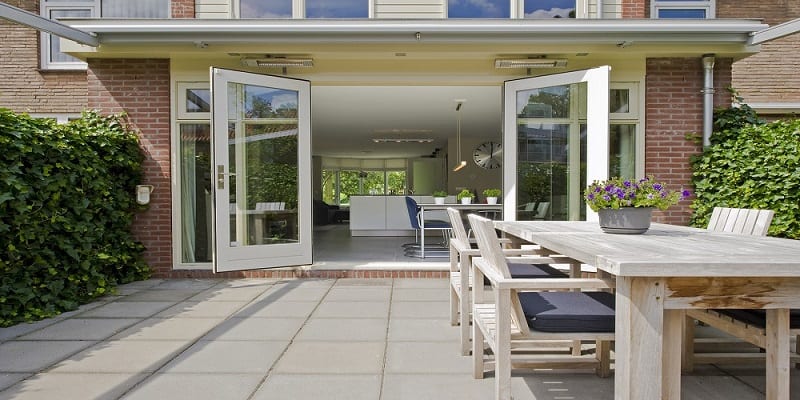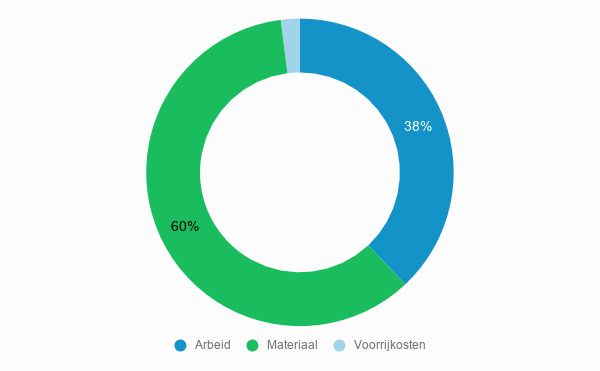Are you planning to extend your living space with an extension, but don’t have a clear idea of the costs? On Renoca you will find clear price information, so you won’t overlook anything and can make an informed choice.
Table of contents
- What does an extension cost?
- Price examples
- What will your money be spent on?
- What are price-determining choices?
What does an extension cost?
The average cost of an extension is around £16,000 – £25,000, including materials and installation. What affects the extension costs: width/depth, prefab (ready-made)/made-to-measure and the types of materials such as bricks/aluminium or double-glazed/hr++ glass.
See below the various extension prices for the most commonly chosen size of extension (5 metres wide, 3 metres deep).
| Type of annex | Cost of prefabricated annex (ready-made) | Cost of customised annex |
|---|---|---|
| Classical/modern | £ 18.000 – £22,000 | £21,000 – £25,000 |
Find the best specialist for your project and get free quotes.
Start

Price examples
In the price table you can see the average prices of a building extension. Of course, the exact price depends on your requirements. Are you going for the cheapest price or do you want the most luxurious extension? The following situations will give you a good idea of the cost of your extension:
The cheapest choice:
The most economical choice is a standard prefabricated extension without any extras, with minimal finishing. The price for this type of extension is between £16,000 and £18,000. This does, of course, include the installation of the extension.
The most practical choice:
Don’t want too much work on the extension yourself? A bespoke extension in the modern style is a wise choice. If you opt for this, including finishing and electrics, the price will be between £21,000 and £25,000.
The most luxurious choice:
If you opt for a large, modern made-to-measure extension with all the trimmings, the cost will go up to £50,000. This then includes accessories such as luxury window frames, electrics, underfloor heating and a sliding door.
What will your money be spent on?

You can see that around 60% of the price for an extension consists of material costs. This means that the choices you make have quite an impact on the price. Of the price, 2% is due to call-out charges. The remaining 38% are labour costs. You can save on labour costs because specialists charge different rates. Get several quotes to compare the labour costs.
What are price-determining choices?
Construction prices depend on the following choices:
Choice 1: Size
The size of the extension you choose depends largely on your house and the position of the extension. Most people choose a width proportional to the house for optimal results. Using the most commonly chosen format as a starting point, you can calculate how much a basic extension will cost:
- Width: For every 0.5 metre more or less width, the price changes by £1,000. There is a maximum width of 10 to 12 metres wide. Do you think it’s a waste to reduce the garden by a large chunk? Then opting for more width is a good middle way between more space at home and a garden of nice size.
- Depth: For 0.5 metres more or less depth, the price is around £1,300. Half a metre seems little, but this will immediately give you a more spacious house and in addition, the value of the house can go up. Assuming that the width is as in most cases larger, 0.5 metres depth will provide more effective living space than an extra 0.5 metres width.
Choice 2: Prefabricated or custom-made
The method of construction is an important part of the price. Therefore, it is smart to think about it carefully before choosing either.
- Prefab:With this, the extension is delivered to the company’s factory. It is then moved to your home in its entirety. Because it is built in the factory, it can save you around £2,000 compared to a custom-built extension. In addition, a prefabricated extension is put up in a short time, saving you on labour costs.
- Customisation:A customised extension is built on site. The advantage of customisation is that your wishes and requirements can be implemented more easily than with prefab, because nothing is fixed yet. If you have specific wishes, customisation is the way to get your own unique annex.
Choice 3: Doors and windows
Your annex can fit several types of doors and windows. This choice has a lot of influence on the atmosphere the extra living space will exude.
- Rooflight:Do you prefer more light in your home or like to watch the stars at night? A skylight is the solution. The choice is between a lectern and a saddle skylight. The additional cost of a skylight is about £2,500. For a specialist, installing a skylight is no problem.
- Windows:For more light and a nice view outside, your extension should have windows. A standard extension already includes a window, but more light is quickly obtained by adding an extra window for about £1,000 extra.
- Garden door:A garden door is a standard option with an extension. Apart from providing an extra entrance and exit, a garden door also creates more light. This makes for a more pleasant living space.
- Sliding door:Many people prefer to choose a sliding door. This often lets in more light and gives a more spacious feel. You can get all this with an extra investment of around £1,000.
Choice 4: Piles
It’s not always necessary, but sometimes you need to use piles for a good foundation for your extension. Always get advice from a specialist in this field to avoid problems at a later stage. Piles cost around £1,500 per two.
Choice 5: Additional options
For an extension, there are also options that are not necessarily necessary, but might be on your wish list. These options have been included in the calculated average:
| Option | Average extra cost |
|---|---|
| Field breakthrough | £3.000 |
| Plasterwork | £ 1,000 |
| Electricity | £ 450 |
| Central heating (incl. radiator) | £ 1.000 |
| Framework | £ 300 |
Find the best specialist for your project and get free quotes.
Start